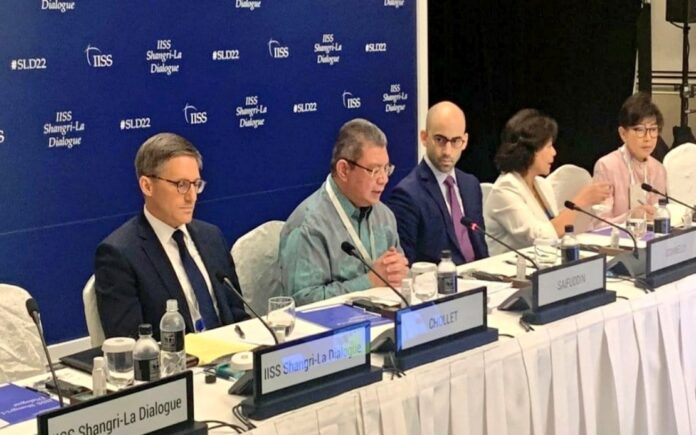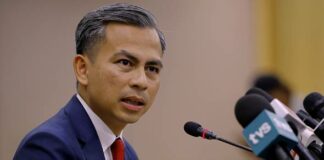SINGAPORE, June 11 — There is a need to put more pressure on the military authority in Myanmar to resolve the current crisis and it should be done through a “combination of ways”, said Malaysia’s Foreign Minister Datuk Seri Saifuddin Abdullah.
Speaking on the topic titled “Myanmar: Finding A Way Forward” at a Plenary Session of The 19th Shangri-La Dialogue today, Saifuddin said one of the ways “is to talk to people whom the Junta would want to listen (to).”
“We have to also try that area; and if the Junta is not going to listen to any one of us from ASEAN, then we have to look at ASEAN Dialogue Partners that the Junta may want to listen to,” he added.
Taking a question from the press after the session on who might be the Dialogue Partners that the Junta might listen to, Saifuddin noted that “it is difficult to say and to state out loudly which are the Dialogue Partners.”
“But people who have been following what’s happening in Myanmar will know that there are probably one or two Dialogue Partners of ASEAN that the Junta would listen to more compared to the others,” he added.
“So we have to have a combination of ways. On one hand, adding pressure… On the other hand, talking to people that the Junta might want to listen,” said the minister.
To the question of whether the expulsion of Myanmar is on the table, Saifuddin said : “I don’t think any one of the Foreign Ministers in ASEAN has ever spoken of expelling Myanmar.”
“I think the only debate that we have had, if not within us but also with others, is on the issue of non-interference; but I have raised the idea of it’s not about non-interference, we should hold this principle about non-indifference which is even more important,” he said.
The minister also expressed his concern that the Myanmar Junta may be emboldened by ASEAN’s absence of seemingly non-concrete actions.
“That’s exactly my worry. If we don’t have the answer to those hard questions, by the time the Summit meets again at the end of the year, then the Junta will have a field day, probably saying “see, ASEAN is not able to do much”. And that’s exactly what we don’t want.”
During the session, Saifuddin also said that there is a need “to strengthen the role of the ASEAN special envoys.”
“I do not want to jump the gun. I haven’t spoken to my colleagues yet. I don’t think it is the right and appropriate moment to give ideas, but we are meeting informally in Delhi for the ASEAN-India Foreign Ministers’ Meeting on the 16 and 17 of June.”
“I think in that informal meeting, I would ask my friends to seriously look into how we can strengthen the role of the ASEAN special envoys, including the roadmap.
Saifuddin earlier alluded to the roadmap briefly in terms of listing down actual things that he said need to be done “within a certain specific timeline.”
Among others, Saifuddin reiterated the need for new and creative ways that are inclusive and comprehensive to achieve meaningful implementation of the ASEAN 5-Point Consensus due to the lack of progress.
ASEAN, he said, must go back to the drawing board and implement a more detailed roadmap to achieving the 5-Point Consensus within an appropriate timeframe, with humanitarian assistance and COVID-19 vaccination being given top priority.
The 5-Point Consensus did not indicate the exact stakeholders; thus, it must be made to include Aung San Suu Kyi and former President Win Myint and, more broadly, the National Unity Government (NUG) as well as the National Unity Consultative Council (NUCC), he said.
Saifuddin also stressed that there must be no hindrance or discrimination against humanitarian and cross-border assistance and must include local civil society organisations.
“Malaysia regrets that at the Myanmar humanitarian meeting, the UN Secretary-General’s Special Envoy on Myanmar Dr Noeleen Heyzer was uninvited,” he said.
ASEAN, he said, must also develop a regional approach and initiative that strengthens and protects civilians that have left Myanmar, including the Rohingyas.
To this end, he said, the Independent Permanent Human Rights Commission of OIC (OIC-IPHRC) will organise a conference on the right to education for refugees in Kuala Lumpur in October 2022.
















